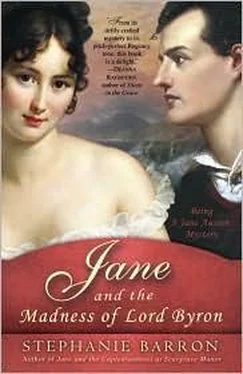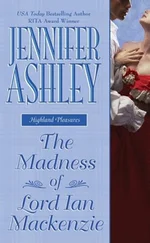A moan of horror went up from our assembled crowd; and for an instant, all breath and movement was suspended. I saw, as in a dream, China Trade swirl across the finish; saw her jockey pull up his heaving mount in expectation of universal acclaim—and watched, as horror freed its grip, the first of the gentlemen bolt past the victorious mare in the direction of the insensible lady lying prone on the ground.
“As I observed,” Lady Oxford said drily, “the wretched fool has broken her neck. How in God’s name are we to explain it to William Lamb?”
Desdemona made as if to descend from her carriage, but her husband’s hand on her wrist stopped her.
“Stay,” he said. “I shall go. You can do nothing there.”
The black colt had scrambled to its feet but stood all of a huddle, head hanging, one back leg pulled up as tho’ in agony. Several gentlemen had reached Lady Caroline, and knelt about her; one of them called, in an agitated accent, “She breathes!”
“Praise God,” Lady Oxford murmured; and again, I was startled at her charity.
A crack, as of a pistol shot, rang out—and I saw to my horror the beautiful black colt crumple to the ground, with a shudder as profound as thunder—a ruin to Lady Caroline’s whims. It was the starter’s pistol that had done it; and a gentleman stood a moment over the pitiable creature, staring at its noble head, pistol dangling, before turning away.
“I suppose the hind leg was broken in the tree,” Lady Oxford said with a slight catch in her voice. “I cannot bear to see it—a hunter of mine went in just such a way, some years since, when I rode with the Quorn. [20] The Quorn Hunt, founded in 1696 by Mr. Thomas Boothby of Tooley Park, Leicestershire, is still in existence today. It was considered one of the most rigorous, demanding, and exciting of the hunts of Jane Austen’s time, and to be invited to ride with its members conferred considerable prestige. It takes its name from the village of Quorn, where the pack was kenneled from 1753 to 1904. — Editor’s note.
God forgive us for the way we use our beasts.”
“I hope He may find it in His heart to forgive Lady Caroline, at least,” I murmured. “She drove that colt to its destruction.”
Lady Oxford was silent a moment. “I have often thought it is herself she wishes to destroy. But until that day—Caro will be content to smash everything near her,” she said.
Chapter 20 The Green-Eyed Monster
WEDNESDAY, 12 MAY 1813
BRIGHTON, CONT.
I MAY BE FORGIVEN IF I CONFESS THAT AFTER SO EXHAUSTING a day, replete with inquests, seductive poets, duelling inamoratas , and suicidal races, I looked for nothing more engaging than an early dinner and an inviting bed. First, however, I was required to witness Lady Caroline Lamb’s retirement from the field—sensible at last, and carried aloft on a hurdle, with her riding habit trailing to the ground like a heroine out of Shakespeare.
I must observe, as an aside, that I am forever put in mind of the stage when I am treated to one of Caro Lamb’s scenes; and I am hardly alone in this. Her life is lived on so dramatic a plane that the theatre cannot be far from one’s thoughts. This reflection leads me inevitably to another: Does the air of High Tragedy persist, even when the lady is entirely alone, and playing only to her mirror?
I should like a private interview with Lady Caroline—she betrayed herself as so completely in possession of the history of Catherine Twining, when she chose to spar with Lady Oxford, that I imagine she gained rather more of the child’s confidence than she admitted at the inquest. It is even possible she might say more of her parting from Catherine—the exact hour and circumstance that left the poor girl without escort home to Church Street—if properly managed.
And what, I wonder, is the significance of the name Leila ? We two shall have much to discuss, once Caro’s shattered frame is on the mend.
I say shattered, but in truth she broke no bones, being but shaken to her core. The ground dealt a shocking blow to the head; she took leave of her senses; and was less than coherent for several hours after, according to general report. Lord Wyncourt—whose horse had come to grief without the necessity of being shot—was kind enough to bear Caro Lamb back to the Pavilion in his laudaulet; and it was from his words the intelligence soon emanated the length and breadth of Brighton, which had seen nothing to equal her ladyship’s display since the Regent had grown too fat to gallop over the Downs.
I shudder to think what must have been Caro’s reception, once the news of the black colt’s end was received at the Pavilion. The Regent’s love for his horses is everywhere known—and is said to exceed even his love of women. His Royal Highness cannot, in good conscience, despatch an injured lady post-haste back to London, even were the magistrate to allow it; but it is certain that Caro Lamb is in disgrace, and shall be barred from the stables so long as she remains in the town.
“What a race, eh, Jane?” my brother crowed as Mona backed and turned her phaeton in preparation for quitting the meeting-ground. Henry was standing with deceptive insouciance beside China Trade, as tho’ he had been an intimate of Lord Swithin’s this age, a privileged friend and sporting companion.
How Eliza should have loved the picturesque ! I thought with a pang. And almost forgave her betrayal.
The sprightly mare’s bay coat was darkened with sweat, but she appeared to regard the exertion so little, as to be ready to try a second round of the course. The Earl’s countenance had regained its colour, and he met a hail of felicitations from the gentlemen whose wagers he had justified, with becoming relish.
The ladies of the party, I may disclose, accomplished the return to Brighton in subdued spirits. Desdemona was disposed to exclaim about Caro Lamb and her mad behaviour, and I might have seconded her observations with praise of the Earl’s game little jumper, had not Lady Oxford’s demeanour silenced us both. Her ladyship was lost in distraction, and that the tendency of her thoughts ran to Lord Byron, and all that Lady Caroline had disclosed, was revealed by her asking abruptly, “Does George truly mean to dine with you tonight, Mona, or is that but a falsehood as well?”
Desdemona shot me a sidelong look—I was wedged between the two Countesses—and said diffidently, “I depend upon his appearance, as he accepted the invitation with alacrity only this afternoon. He was most solicitous for your welfare, Jane, I assure you—being well aware that the Regent is no great favourite of yours, and that it is His Royal Highness who sets the tone of Society in Brighton. Byron had no wish to see you come to hammer-and-tongs with Prinny over Princess Caroline.”
“—He did not wish to see me snubbed , you mean,” Lady Oxford returned. “It would never do for the acknowledged maîtresse of so celebrated a poet, to receive the cut direct from all Brighton. Pray speak plainly, Mona. Does he dread my coming?”
“ What ?” her ladyship exclaimed, as tho’ outraged. “George, dread to see the lady nearest his heart? Do not be a goosecap, my dear! You cut your Wisdoms too long ago!”
It was perhaps unfortunate that Mona should have invoked Lady Oxford’s age , at such a moment, when her friend required only reassurance; it was done entirely without malice, however, as the unfortunate adoption of cant expressions usually is—with frequent disastrous effect.
“Yes, I’m rather more than seven,” her ladyship observed acidly; and to my horror, she began to weep. Mona, on my left hand, was entirely unaware of the distress she had caused. Tears streamed silently down Lady Oxford’s cheeks, trailing through the powder and rouge her ladyship employed—which can only have served as salt in her wounds. I drew a clean handkerchief from my reticule and wordlessly offered it. Lady Oxford mopped delicately at her face.
Читать дальше












